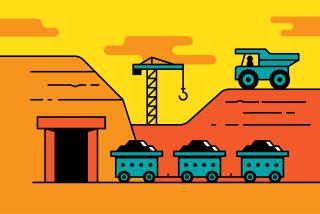A New Plant Forges Success in an Old Craft
Joel Corona received only a seventh-grade education in his home state of Michoacan, Mexico, but in the past decade he has mastered one of the world’s oldest trades, blacksmithing.
Manuel Rodriguez, six years younger than Corona at 31, is his student. A onetime construction worker, Rodriguez wanted to apply skills he picked up in past jobs to something more artistic.
Both are among the 200 employees at Murray’s Iron Works--a company industry experts describe as one of the largest of its kind--which opened last month in a portion of South-Central Los Angeles that has been caught in a downward economic spiral since the 1992 riots.
City officials say the establishment of Murray’s Iron Works and other businesses in the struggling Alameda industrial corridor is an early step in revitalizing the area.
Perhaps more significantly, Murray’s Iron Works came to South-Central to take advantage of government subsidies and the local labor pool, leaving behind a 39,000-square-foot plant in Culver City.
The new 205,000-square-foot plant not only occupies property that had been a large, vacant eyesore, it also functions as an educational incubator of sorts, offering apprenticeships to those who, like Rodriguez, are new to the craft.
On his first day, Rodriguez, of South Gate, learned to forge iron into cylinders and squares to be used as decorations on chairs and tables.
He then heated one of the squares, about 5 inches across and as thick as a finger, in a gas furnace until it glowed bright red. He took it out with tongs, flattened it with a few strikes of a hammer and dropped the square in a pile.
While this task is pretty simple, it’s a step to learning more complicated techniques. It’s much more satisfying than the construction work he used to do, Rodriguez said.
“I wanted to get familiar with design work,” said the father of four. “A lot of people have been asking me to do stuff like this on the side and I wanted to get to learn about it.”
Theirs isn’t a business known for large-scale production facilities. Most blacksmiths--like their counterparts, farriers, who shoe horses--work part-time in the age-old trade or in small shops.
The profession saw a dramatic decline for decades, until recently, said Gordon Kirby, president of the California Blacksmith’s Assn.
The blacksmith population has increased recently because “there’s been a large demand for hand-forged works,” said Kirby, who runs a small shop in Sonoma, and is president of the 854-member association.
Murray’s Iron Works took full advantage of that demand. Since Ed Leisner became the company’s president in 1986, he and his brothers, Gary and Steve, have grown their father’s one-man shop into one of the industry’s largest. The company now has showrooms in West Hollywood, Dallas, San Francisco, Chicago and Dania, Fla.
The company’s last plant, really a cluster of buildings, was never ideal because it was too spread out. It also was difficult to recruit workers.
Culver City is a “bedroom community,” Leisner said. “When I put out job ads in Culver City, no one came out.” More than 20 applicants showed up when he advertised the workshop’s April 11 grand opening in South-Central, he said.
Murray’s Iron Works purchased the new plant for $5.3 million. Leisner expects to spend $2 million to refurbish the building.
By setting up shop in the Alameda industrial corridor, a city redevelopment zone, Leisner is eligible to receive state, federal and city incentives. Murray’s Iron Works gets a 35% break on its monthly electric bill. The company also gets federal and state tax credits over the next five years for each employee it recruits from economic target zones, communities with a significant unskilled labor force.
The business brings a much-needed “cycle of revenue” to South-Central, said Jasper Williams, director of the city’s industrial and commercial development division. Murray’s Iron Works is one of a handful of major employers to embrace the area in recent years, Williams said.
“People talk about rebuilding after the riots,” Leisner said, “but if you don’t do anything to help the community, all you’re doing is talking.”
Leisner said he’s looking to hire two dozen more employees. The only stipulation, Leisner said, is that applicants must be willing to work with their hands. He’s advertising exclusively in Spanish-language newspapers, he said.
“There are two main reasons we chose this location,” Leisner said. “The size of this building and the size of the local labor pool. We felt that this area had a tremendous potential for employees.”
Murray’s Iron Works employees make anywhere from $12 to $25 an hour, depending on their experience.
Master blacksmith Corona said he’s taught more than a dozen apprentices over the years. Many of them still forge metal alongside him. Others have taken what they’ve learned and gone elsewhere.
“This is the kind of work I like,” said Corona through a translator. “It’s the type of thing I thought I could make a career out of.”
Corona, a blacksmith who’s been with Murray’s Iron Works for a little more than a decade, recently moved his family into a house he purchased in Hawthorne.
On a recent afternoon, he used a technique called heli-arcing to weld a bronze fireplace screen. In between blasting the gold-colored screen with a small torch, he supervised three other employees.
“I didn’t know anything about welding or the whole process,” he said. “Now I can do everything, from start to finish.”
More to Read
Sign up for Essential California
The most important California stories and recommendations in your inbox every morning.
You may occasionally receive promotional content from the Los Angeles Times.










